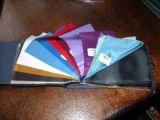|

Informal
saddle suits should be of a conservative, preferably dark color which appears to be solid. Small pinstripes or herringbone-type
patterns are acceptable as long as the material appears from a distance to be of a solid nature. According to the USEF
Rule Book, accessories are to be the same color as the suit itself. Taken literally this would mean that derbies, boots, ties,
vests and gloves must all match. However, at this time the equitation division is tolerant of and will allow contrasting derbies,
ties, boots, vest and gloves, but the key word to remember when considering them is conservative. An emerald green or fire-engine
red derby may match your vest, but is definitely not conservative and should be avoided.
This
also applies to contrasting gloves as well as derbies. A safe rule of thumb to follow is that if a contrasting derby is worn,
it should be of the same color family as the riding habit but may be several shades lighter or darker. It is also reasonable
to assume that if you have doubts as to whether a particular color of fabric is conservative, then others will probably have
the same doubts and you would be wise to choose something else. Day coats are not permitted.
Equitation classes are classes where elegance and
class are the highest priority. When shopping for suits another factor to keep in mind is the size
and age of the rider. Light colors are suitable only for younger riders (under age 18). Also the color of the suit varies
by the precision of the rider. Although every level of exhibitor can wear a dark suit, beginners should not stray from black,
brown or navy with a matching derby. Extremely advanced riders can often wear lighter colors that will call attention to the
quietness of their hands, legs and feet.
The color combination chosen for each outfit can be the most
important aspect of the suit. Remember to keep your look understated. Exhibitors need to express themselves, but they can
do it in a conservative style. These all give the look of professionalism. While your classic
suits of navy blue, black or charcoal gray will always be in fashion (and are actually more favorable right now); brown suits
are also coming back into fashion. This hue can be quite elegant and beautiful on a woman and really complement her style
and skin tone. Shirts, vests and ties are following street fashion and picking up a lot of bold colors and it is acceptable
and attractive to have a tastefully colored or patterned vest that complements the suit color.
The tie is the crucial element that pulls together your entire suit and offers color. The entire look of a suit can be changed
just by switching the tie, so be careful what you select and be sure to give it a lot of thought.
Formal attire is even more conservative and is only allowed after
6:00 pm. It is recommended but not mandatory that tuxedos be worn in the evening, so judges should not penalize riders who
do not wear them. There is no allowance in formal attire for contrasting colors, with one exception made for gloves. This
means the collar and lapels must be of the same color as the jacket and the top hat must match the entire ensemble. White
or black tie may be worn, but no contrasting tie/cummerbund sets. Also, either black or white gloves are proper - but keep
in mind that white gloves draw attention to the hands so white gloves are only for riders
with the quietest of hands (and a horse with a steady headset and smooth gaits). If your hands move around faster than you
type, stick with darker gloves à la navy or black.
Derbies and Top Hats should match the suit and should be very well
shaped. Remember, this is what frames your face! And if you are wearing a navy suit don't wear a black derby, and vice versa. If your suit is a hard to find derby color then match the derby to your boots and
gloves, or get one custom dyed.
Coat Lining should ALWAYS match your coat as closely as possible.
Contrasting linings are very distracting to the eye, out of fashion, can make the rider look bouncy or less fluid (having
a white flag flapping around on your hip tends to make you look much less smooth!) and will kill the resale value of your
suit.
|



